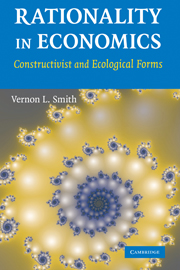Book contents
PART I - RATIONALITY, MARKETS, AND INSTITUTIONS
Published online by Cambridge University Press: 18 May 2010
Summary
Subsidiary awareness and focal awareness are mutually exclusive. If a pianist shifts his attention from the piece he is playing to the observation of what he is doing with his fingers while playing it, he gets confused and may have to stop. This happens generally if we shift our focal attention to particulars of which we had previously been aware only in their subsidiary role. … The arts of doing and knowing, the valuation and the understanding of meanings, are … only different aspects of extending our person into the subsidiary awareness of particulars which compose the whole.
Polanyi (1962, pp. 56, 65)As we have no immediate experience of what other men feel, we can form no idea of the manner in which they are affected, but by conceiving what we ourselves would feel in a like situation.
Smith (1759; 1982, p. 9)This division of labor … is not originally the effect of any human wisdom, which foresees and intends that general opulence to which it gives occasion. It is the necessary, though very slow and gradual, consequence of a certain propensity in human nature which has in view no such extensive utility; the propensity to truck, barter, and exchange one thing for another. … It is not from the benevolence of the butcher, the brewer, or the baker, that we expect our dinner, but from their regard to their own self-interest. We address ourselves, not to their humanity but to their self-love, and never talk to them of our own necessities but of their advantages.
Smith (1776; 1981, pp. 25–7)- Type
- Chapter
- Information
- Rationality in EconomicsConstructivist and Ecological Forms, pp. 13 - 14Publisher: Cambridge University PressPrint publication year: 2007



